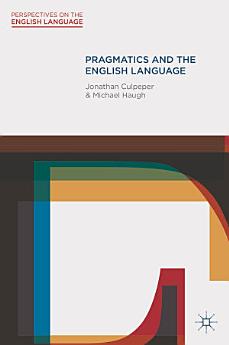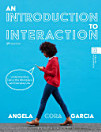Pragmatics and the English Language
আগ ২০১৪ · Bloomsbury Publishing
ইবুক
316
পৃষ্ঠা
reportমূল্যাংকন আৰু পৰ্যালোচনা সত্যাপন কৰা হোৱা নাই অধিক জানক
এই ইবুকখনৰ বিষয়ে
How do we interpret language and expose its meanings? How does pragmatics describe the English language? Where can we go to acquire a deeper understanding of pragmatics?
Pragmatics and the English Language is a bold new textbook that presents an innovative and exciting way of looking at the subject. This new perspective, called integrative pragmatics, steers a course between what have historically been considered irreconcilable perspectives. With an emphasis on empirical data, the book is filled with examples from cartoons, films and historical sources, as well as face-to-face and digitally-mediated interactions, all of which are used to help the reader develop a better understanding of the theory.
Pragmatics and the English Language:
- Focuses on both the pragmatic aspects of English and how pragmatics is shaped by English
- Synthesizes traditional ideas with state-of-the-art pragmatics research
- Goes far beyond the coverage found in other pragmatics textbooks
Shedding light on the English language in highly original ways, Pragmatics and the English Language is essential reading for advanced students of the English language and linguistics, along with anybody else who wishes to develop a more in-depth knowledge of pragmatics.
Pragmatics and the English Language is a bold new textbook that presents an innovative and exciting way of looking at the subject. This new perspective, called integrative pragmatics, steers a course between what have historically been considered irreconcilable perspectives. With an emphasis on empirical data, the book is filled with examples from cartoons, films and historical sources, as well as face-to-face and digitally-mediated interactions, all of which are used to help the reader develop a better understanding of the theory.
Pragmatics and the English Language:
- Focuses on both the pragmatic aspects of English and how pragmatics is shaped by English
- Synthesizes traditional ideas with state-of-the-art pragmatics research
- Goes far beyond the coverage found in other pragmatics textbooks
Shedding light on the English language in highly original ways, Pragmatics and the English Language is essential reading for advanced students of the English language and linguistics, along with anybody else who wishes to develop a more in-depth knowledge of pragmatics.
লিখকৰ বিষয়ে
Jonathan Culpeper is Professor of English Language and Linguistics in the Department of Linguistics and English Language, Lancaster University, UK.
Michael Haugh is Associate Professor in the School of Languages and Linguistics, Griffith University, Australia.
Michael Haugh is Associate Professor in the School of Languages and Linguistics, Griffith University, Australia.
এই ইবুকখনক মূল্যাংকন কৰক
আমাক আপোনাৰ মতামত জনাওক।
পঢ়াৰ নির্দেশাৱলী
স্মাৰ্টফ’ন আৰু টেবলেট
Android আৰু iPad/iPhoneৰ বাবে Google Play Books এপটো ইনষ্টল কৰক। ই স্বয়ংক্রিয়ভাৱে আপোনাৰ একাউণ্টৰ সৈতে ছিংক হয় আৰু আপুনি য'তে নাথাকক ত'তেই কোনো অডিঅ'বুক অনলাইন বা অফলাইনত শুনিবলৈ সুবিধা দিয়ে।
লেপটপ আৰু কম্পিউটাৰ
আপুনি কম্পিউটাৰৰ ৱেব ব্রাউজাৰ ব্যৱহাৰ কৰি Google Playত কিনা অডিঅ'বুকসমূহ শুনিব পাৰে।
ই-ৰীডাৰ আৰু অন্য ডিভাইচ
Kobo eReadersৰ দৰে ই-চিয়াঁহীৰ ডিভাইচসমূহত পঢ়িবলৈ, আপুনি এটা ফাইল ডাউনল’ড কৰি সেইটো আপোনাৰ ডিভাইচলৈ স্থানান্তৰণ কৰিব লাগিব। সমৰ্থিত ই-ৰিডাৰলৈ ফাইলটো কেনেকৈ স্থানান্তৰ কৰিব জানিবলৈ সহায় কেন্দ্ৰত থকা সবিশেষ নিৰ্দেশাৱলী চাওক।







